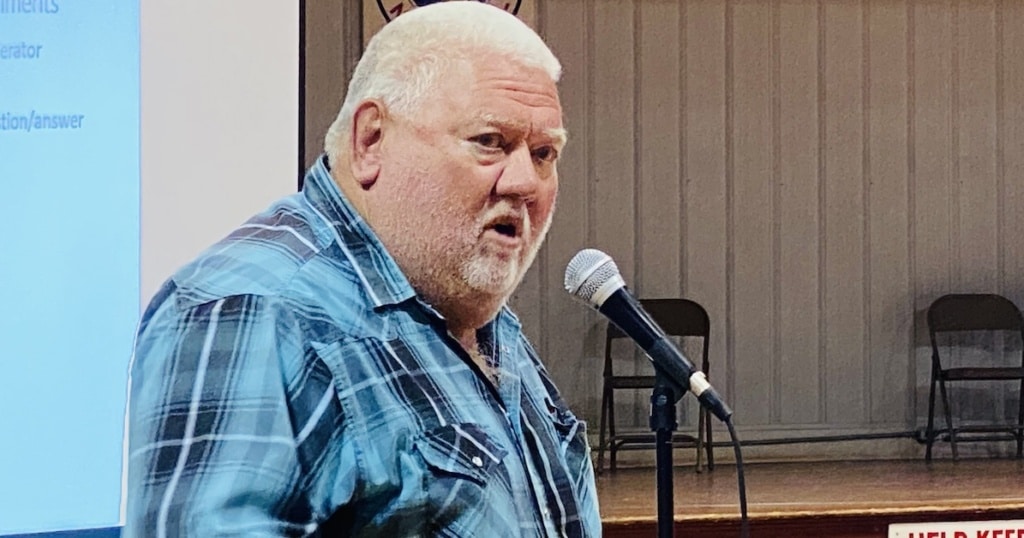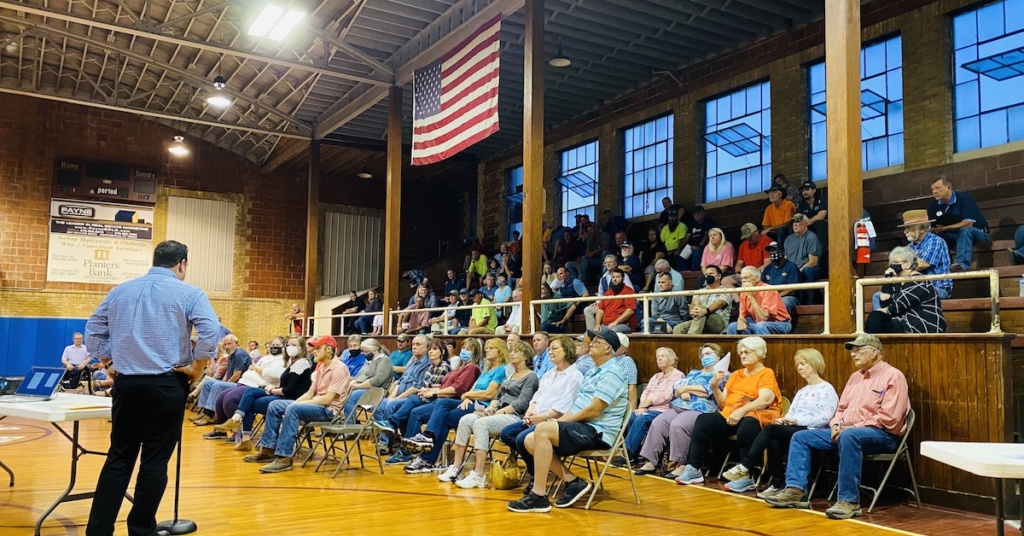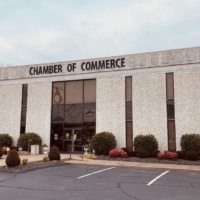A small group of industrial recruiters who want to bring a massive beef packing plant employing close to 1,400 people to a site at the edge of Pembroke continued Monday to make their case for the unnamed company.
But several dozen residents who live close to the proposed site on John Rivers Road overwhelming opposed the plan during a community meeting Monday night in the old Pembroke school gymnasium. They cited concerns about the smell of cattle and manure, truck traffic, wastewater treatment, groundwater pollution, the available workforce, housing for workers and school capacity. A few suggested not wanting an influx of foreign workers who are expected to staff the plant.

Farmer Phillip Garnett, whose family helped organize the Pembroke meeting, said beef processing doesn’t fit with Christian County agriculture. The county is known for wheat, corn, soybeans and tobacco — not livestock. He agreed the county needs ag processing plants, but not meatpackers, he said.
“They are live animals. They are going to crap on your roads … believe me,” he said in brief comments that brought many in the crowd of roughly 150 people to their feet and cheering.
Places like Green Bay have a history of slaughterhouses and meatpacking, but Christian County does not, he said.
Garnett, who previously declined a request to comment on the project, said he hadn’t planned to speak at the meeting. He and his brother Billy Garnett own the roughly 375-acre site that the South Western Kentucky Economic Development Council (SWKEDC) is marketing to the meatpacker. The land adjacent to the CSX rail line is under contract with the Hopkinsville Industrial Foundation, which has an option to purchase the tract. The price is reportedly more than $12 million.
The industrial foundation’s three-year option to buy expires in November. Garnett said Monday he wasn’t sure he would renew the contract under the same conditions that could allow for the construction of a large slaughterhouse. He had assumed the land would go to a manufacturing plant.
Speaking to supporters of the beef processing plant, Garnett said, “I haven’t seen a person who’s ever worked at one that wants to go back. So you need to think about what you are trying to sell to Hopkinsville.”
The site is a 2-mile drive to Pembroke City Hall. It is 8.5 miles from the center of downtown Hopkinsville, but elected officials in Hopkinsville will likely have more to say than Pembroke does about whether the plant is built.
Hopkinsville Mayor Wendell Lynch is one of a handful of local officials who have visited one of the company’s other plants in Green Bay. Hopkinsville City Council is expected to consider incentives for the company.
SWKEDC executive director Carter Hendricks and others directly involved in recruiting have signed non-disclosure agreements that they say prevent them from naming the company.
During a SWKEDC board meeting Monday morning, three representatives of the local delegation talked about their visit to Green Bay — agribusinessman Wayne Hunt, Hendricks and Lynch. Board members Lee Conrad, an insurance executive, and Elizabeth McCoy, CEO of Planters Bank, were also part of the group that visited the plant.

Lynch and Hunt both described the plant as a clean operation and said they did not detect any smells or other problems in the surrounding areas.
“I left there feeling like this can work in Christian County,” Lynch said.
He said, “It’s not a factory that we would be ashamed of.”
Hopkinsville is one of two sites the company is still considering, the mayor said.
Although the region is not known for cattle farms, there are logistical advantages for a beef processing plant here, said Hunt, who is president of Agri-Chem and serves on the Kentucky Agriculture Development Finance Board. Cattle would be trucked into Christian County from other areas, but the company has to also consider its proximity to the places it will sell its finished product.
“I’ve always said you can’t go anywhere without going through Christian County, Kentucky,” Hunt said.
Three U.S. highways (41, 41A and 68) pass through the county, along with two interstates (24 and 69).
Hendricks, in the Pembroke meeting, acknowledged concerns about truck traffic and stressed the need for a proposed industrial connector highway that would run from Interstate 24 to the Pembroke Road near the beef processing plant. In addition to the possibility of that facility, there are already 28 industrial plants along Pembroke Road employing 8,000 workers, he said.
The company looking at Christian County plans a 500,000-square-foot plant that would cost $300 million to build. It is a family-owned business with 75 years of experience in the industry and a history of philanthropic work in communities where it operates, said Hendricks.
It would draw from a workforce of roughly 450,000 in a nine-county region, said Hendricks.
The plant would run two production shifts a day, while an overnight crew would do clean up and maintenance, he said.
Hendricks acknowledged it is “a tough working environment” but he pushed back on concerns about a rise in crime rates and the psychological toll on workers involved in a constant flow of killing animals. Look at Green Bay, a community known for a good quality of life, he said.
The company pays its workers $18 to $25 an hour and offers incentives to help them buy homes, he said.
During the community meeting, a recent transplant talked about the quality of life that attracted him to Pembroke. Justin Wright, a Fort Campbell soldier, said he heard that most members of the military live in Tennessee because they don’t have to pay income taxes.
“That didn’t bother me because the minute I crossed over [Interstate] 24 and saw this area … wow,” he said.
“I married my wife in my front yard on Main Street in Pembroke,” where they are now raising their daughter, he said.
There is no better place to live, he said, describing the community as “a little bit of heaven.”
If a plant that slaughters cattle comes to the area, that will change and he would move, Wright said.
The Pembroke meeting organizers handed out papers listing the names and phone numbers of Hopkinsville City Council members and encouraged opponents of the plant to call them.
A second meeting is being planned in Hopkinsville, probably in mid-October, one of the organizers told Hoptown Chronicle.
Jennifer P. Brown is co-founder, publisher and editor of Hoptown Chronicle. You can reach her at editor@hoptownchronicle.org. Brown was a reporter and editor at the Kentucky New Era, where she worked for 30 years. She is a co-chair of the national advisory board to the Institute for Rural Journalism and Community Issues, governing board past president for the Kentucky Historical Society, and co-founder of the Kentucky Open Government Coalition. She serves on the Hopkinsville History Foundation's board.





